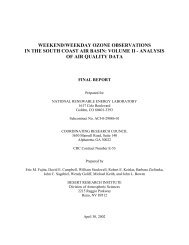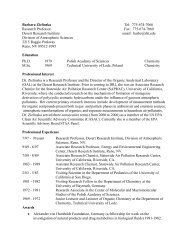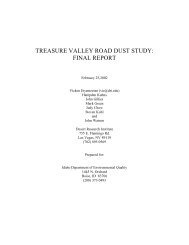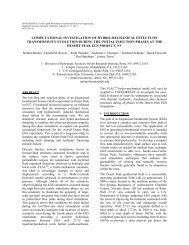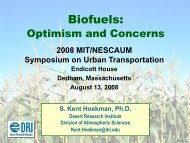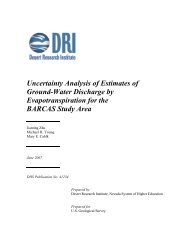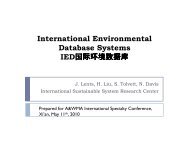Assessment of Conversion Technologies for Bioalcohol Fuel ...
Assessment of Conversion Technologies for Bioalcohol Fuel ...
Assessment of Conversion Technologies for Bioalcohol Fuel ...
You also want an ePaper? Increase the reach of your titles
YUMPU automatically turns print PDFs into web optimized ePapers that Google loves.
The slag leaves the gasifier and is quickly shock cooled to <strong>for</strong>m a vitrified slag. The<br />
company uses the syngas to make methanol.<br />
Development Status–The solid bed gasification system operates at approximately<br />
15 tons per hour. The Endrainet flow gasifier has a capacity <strong>of</strong> approximately 16.5<br />
tons per hour. The BGL gasifier processes pre-treated solid waste at approximately<br />
38.5 tons per hour. The company lists feedstocks able to be processed by its<br />
technology as: wood, sewage sludge, domestic garbage, plastics, light shredded<br />
materials, and other solid waste.<br />
Future Plans–SVZ GmbH’s facility in Germany is being developed into a center <strong>for</strong><br />
industrial application and demonstration <strong>of</strong> innovative coal and waste gasification<br />
technologies.<br />
Syntec Bi<strong>of</strong>uels, Inc., Burnaby, British Columbia, Canada<br />
Organizational Background–Syntec Bi<strong>of</strong>uels (Syntec) was established in 2001 at<br />
the University <strong>of</strong> British Columbia. The company has since been developing catalysts<br />
<strong>for</strong> conversion <strong>of</strong> ethanol using synthetic gas derived from renewal sources. For the<br />
last 2 years, the Syntec research team has focused on developing new ethanol<br />
catalysts that utilize base metal variants suitable <strong>for</strong> commercial deployment.<br />
Technology Characteristics–The Syntec technology, depicted in Figure A5, utilizes<br />
the thermochemical conversion <strong>of</strong> biomass to synthesis gas. The company integrates<br />
other established processes to make syngas from biomass. The syngas can then be<br />
catalyticaly converted to ethanol using Syntec’s proprietary catalyst. In 2004, Syntec<br />
filed a patent <strong>for</strong> its first ethanol catalyst using precious metals. The fuel production<br />
technology relies on low pressure catalytic technology, similar to what is being used in<br />
the methanol industry.<br />
Development Status–The Company has completed both concept and bench scale<br />
testing <strong>of</strong> their technology. Initial experiments to prove out the technology were<br />
carried out at lab facilities at the University <strong>of</strong> British Columbia through a service<br />
contract in paralel with the company’sown facilities in Vancouver and later in<br />
Burnaby. Syntec continues to test their technology at the pilot scale.<br />
Future Plans–Syntec is in the process <strong>of</strong> establishing alliances with potential<br />
strategic partners <strong>for</strong> feedstock, infrastructure, funding and a site <strong>for</strong> a demonstration<br />
plant in the next 2 years. Syntec has filed several patents and expects to fully<br />
commercialize their product within three years.<br />
73



